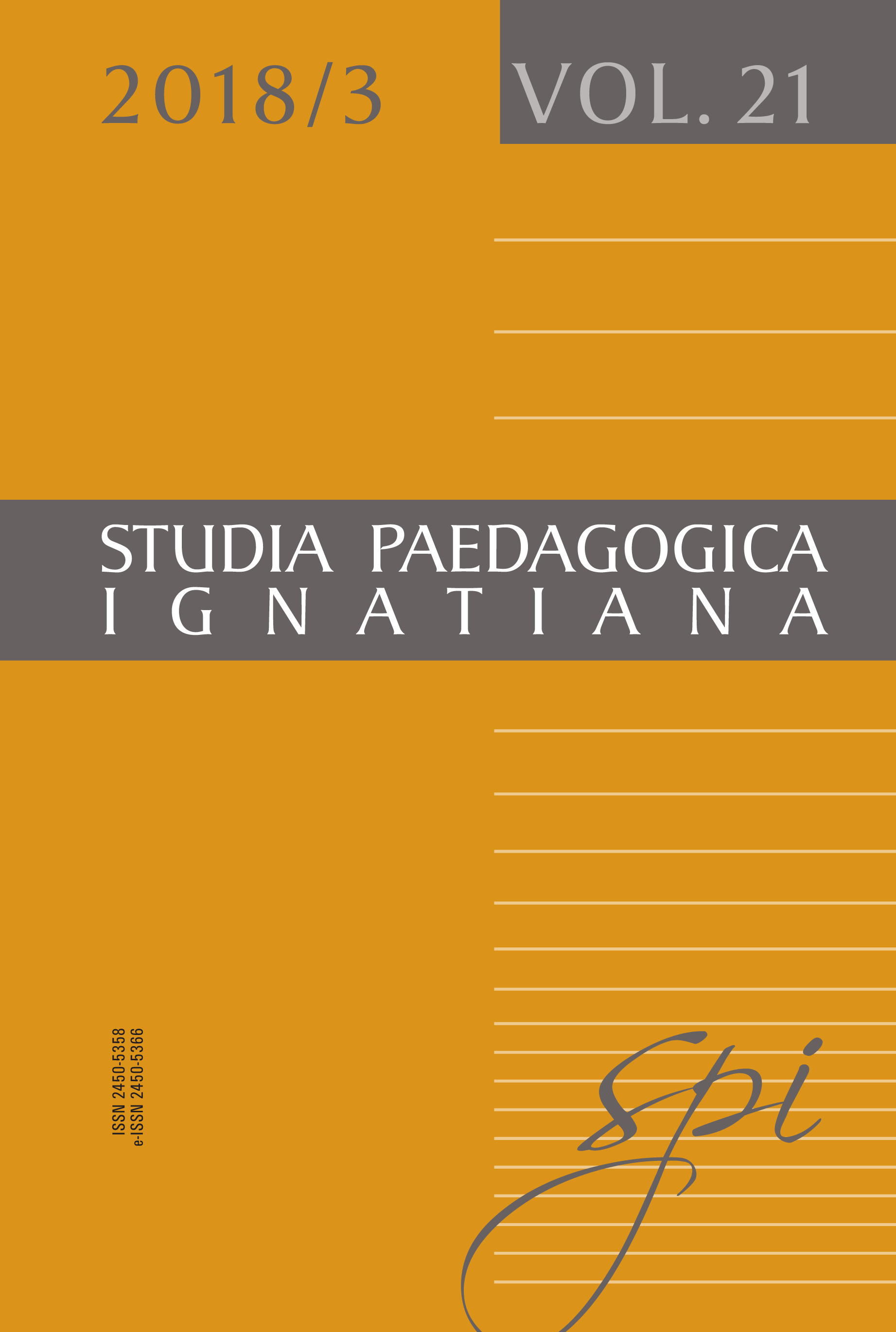Axiological Contexts of Cooperation among Educational Environments in Poland
DOI:
https://doi.org/10.12775/SPI.2018.005Keywords
cooperation, support, values, axiological agreementAbstract
In times of axiological loss, helplessness in the face of the manifestations of spreading evil, the questions about the possibility of the child’s development, supporting him/her in striving for perfection and about the role of the family, school and church in these processes, seems to be justified. The aim of the study was to establish common values of the individuals representing three educational environments and to indicate the possibility of their effective cooperation. Based on participant observation conducted in 2009–2012 (in primary school) and in 2015–2017 (in junior secondary school) some interesting results were collected. The majority of children’s and adolescents’ caregiver find educational, cognitive, moral, prosocial and family values to be the most important. The main conditions for cooperation, which is possible and necessary, include favourable emotional climate, acceptance, trust, democratic respect of mutual rights, commitment, axiology permitting the ontology of ambivalence. The second part of the article presents some examples of joint activities undertaken on the initiative of parents, teachers, RE teachers and priests, such as class and school celebrations, bonfire parties, trips, theatre and cinema visits, meetings with interesting people, workshops conducted by teachers and parents, church events for children and families, preparations for religious ceremonies.
References
Bauman Z., Socjologia, transl. J. Łoziński, Zysk i S-ka, Poznań 1990.
Diagnoza społeczna 2007. Warunki i jakość życia Polaków. Raport, eds. J. Czapiński, T. Panek, Rada Monitoringu Społecznego, Warszawa 2007.
Hejnicka-Bezwińska T., Pedagogika ogólna, Wydawnictwa Akademickie i Profesjonalne, Warszawa 2008.
Jan Paweł II, “Przemówienie wygłoszone na XXXIV Sesji Zgromadzenia Ogólnego ONZ, 2 X 1979,” in: Siła wiary i umysłu. Jan Paweł II, selected by M.E. Bunson, transl. A. Gomola, Dom Wydawniczy Rebis, Poznań 2011, pp. 49–51.
Jan Paweł II, “W imię przyszłości kultury. Przemówienie w UNESCO, Paryż, 2 czerwca 1980,” in: Jan Paweł II, Wiara i kultura, ed. M. Radwan, S. Wylężek, T. Gorzkula, Redakcja Wydawnictw KUL, Rzym – Lublin 1988, pp. 56–59.
Mały słownik etyczny, ed. S. Jedynak, “Branta”, Bydgoszcz 1994.
Kobyłecka E., “Kompetencje aksjologiczne nauczycieli jako problem społeczny,” in: Arytmia egzystencji społecznej a wychowanie, ed. T. Frąckowiak, Fundacja Innowacja i WSSE, Warszawa 2001, pp. 509–520.
Kobyłecka E., Nauczyciele i uczniowie gimnazjum wobec wyboru wartości. Między pewnością a zwątpieniem, Oficyna Wydawnicza UZ, Zielona Góra 2009.
Kobyłecka E., “O niektórych możliwościach porozumienia aksjologicznego nauczycieli, uczniów i rodziców w przestrzeni edukacyjnej,” in: Edukacja. Jakość czy równość?, eds. E. Kobyłecka, I. Nowosad, M.J. Szymański, Wydawnictwo Adam Marszałek, Toruń 2010, pp. 197–214.
Łobocki M., Organizowanie pracy wychowawczej z dziećmi i młodzieżą, Wydawnictwo UMCS, Lublin 1994.
Mariański J., Kryzys moralny czy transformacja wartości? Studium socjologiczne, Towarzystwo Naukowe KUL, Lublin 2001.
Mastalski J., Siewora J., Formacja wychowawców w kontekście przemian cywilizacyjnych, Homo Dei, Kraków 2017.
Mendel M., Partnerstwo rodziny, szkoły i gminy, Wydawnictwo Adam Marszałek, Toruń 2000.
Regulations of the Parents’ Council at Primary School no. 2 with junior secondary classes. www.radarodzicowgim1.cba.pl (access: 08.01.2018).
Serafin K., Doświadczenie i urzeczywistnianie wartości w ujęciu Józefa Tisch-
nera. Studium z antropologii filozoficznej, Oficyna Wydawnicza Politechniki Wrocławskiej, Wrocław 2010.
Szołtysek A.E., Filozofia edukacji. Kształtowanie umysłu, Oficyna Wydawnicza “Impuls”, Kraków 2013.
Śliwerski B., Pedagogika dziecka. Studium pajdocentryzmu, Gdańskie Wydawnictwo Psychologiczne, Gdańsk 2007.
Tillman D., Wychowanie w duchu wartości. Poszerzanie świata 8–14 lat. Program edukacyjny, transl. R. Zawadzki, Wydawnictwa Szkolne i Pedagogiczne, Warszawa 2004.
Tischner J., “Gra wokół odpowiedzialności,” Znak 1995, no. 10(485), pp. 47–55.
Tischner J., Inny. Eseje o spotkaniu, Znak, Kraków 2017.
Winiarski M., Rodzina – szkoła – środowisko lokalne. Problemy edukacji środowiskowej, Instytut Badań Edukacyjnych, Warszawa 2000.
Wychowanie w nauczaniu Jana Pawła II, ed. A. Wieczorek, Wydawnictwa Szkolne i Pedagogiczne, Warszawa 2000.
Downloads
Published
How to Cite
Issue
Section
License
By submitting an article, the author declares that:
they are the author of the article (hereinafter referred to as the Work) and:
- is entitled to exclusive and unlimited copyright to the Work,
- is entitled to dispose of the copyrights to the Work.
The Author grants the Jesuit University Ignatianum in Cracow a free, non-exclusive, territorially unlimited license to use the Work in the following fields of exploitation:
- publishing the Work in paper, digital or magnetic form;
- multiplying the work by any method, without limiting the number of editions or copies;
- distribution of the work and its copies in any form, including marketing, sales, lending, and lease;
- placing the work in a computer memory;
- distribution of the work in information networks, including the Internet;
- public performance, exhibition, display, reproduction, broadcasting and re-broadcasting, as well as making the Work available to the public in such a manner that everyone could have access to it at a time and place chosen by themselves;
- within the scope of dependent rights to the Work, covering, in particular, the right to make necessary changes to the Work, resulting from editorial and methodical preparation, as well as to make translations of the Work into other languages.
The license right shall be transferred the moment of transfer of the Work to the Jesuit University Ignatianum in Cracow. The Jesuit University Ignatianum in Cracow is entitled to grant sub-licenses to the Work in terms of the right granted. The license shall be limited in time for a period of 15 years from the date it is granted.
Stats
Number of views and downloads: 522
Number of citations: 0



